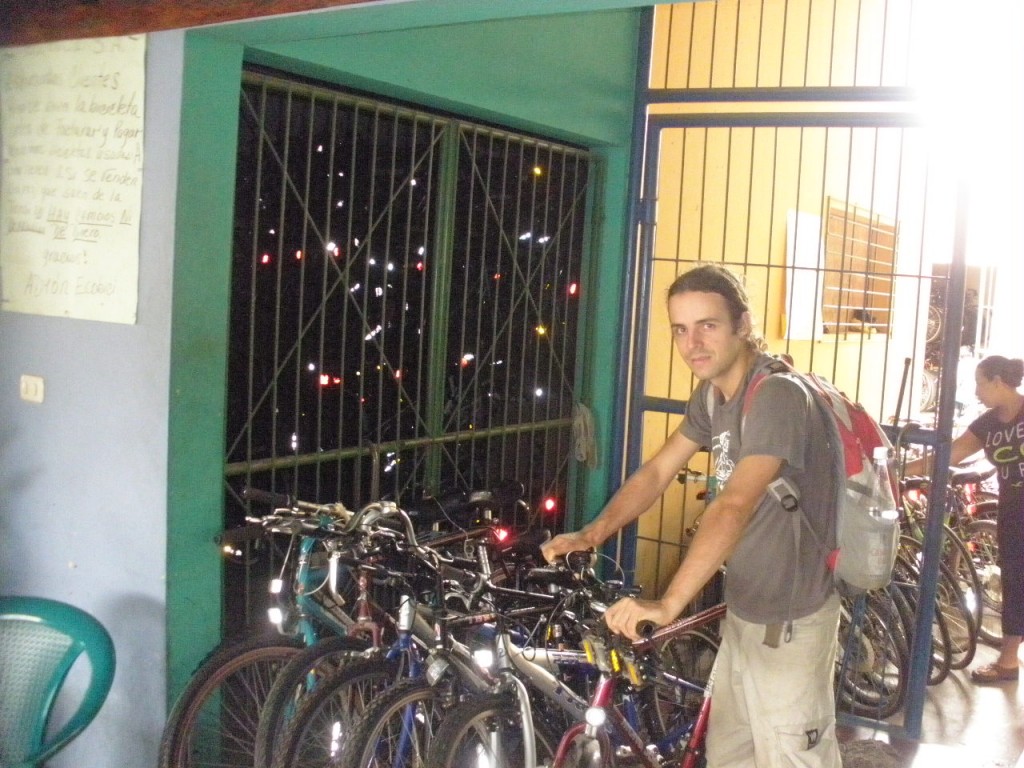
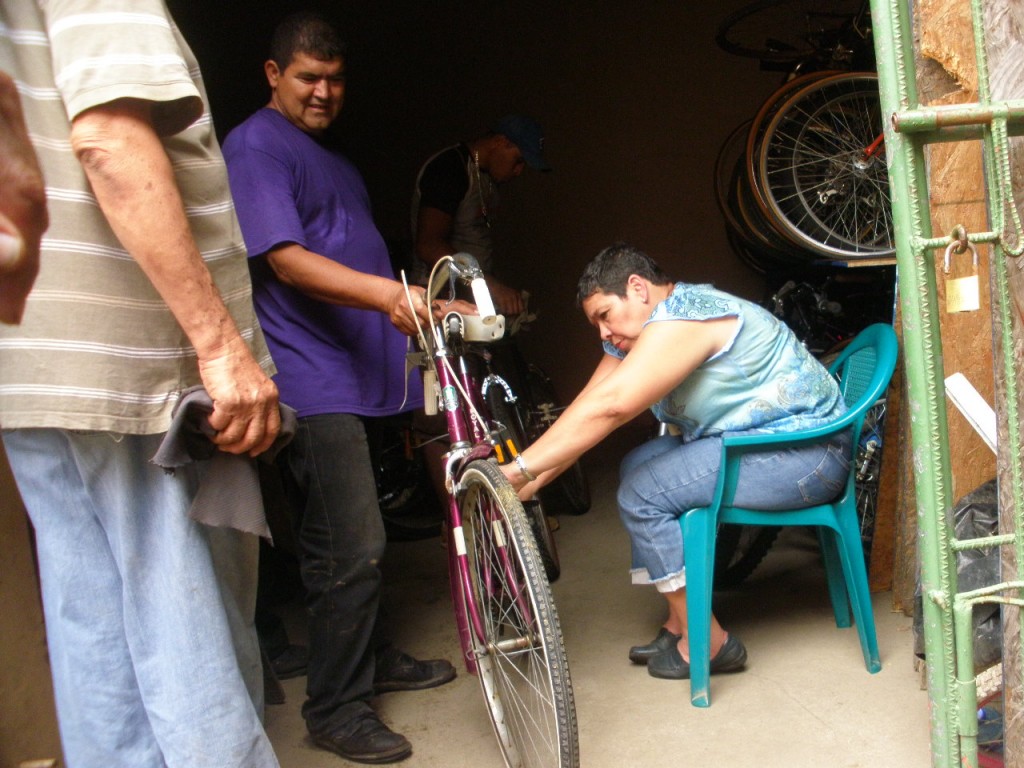
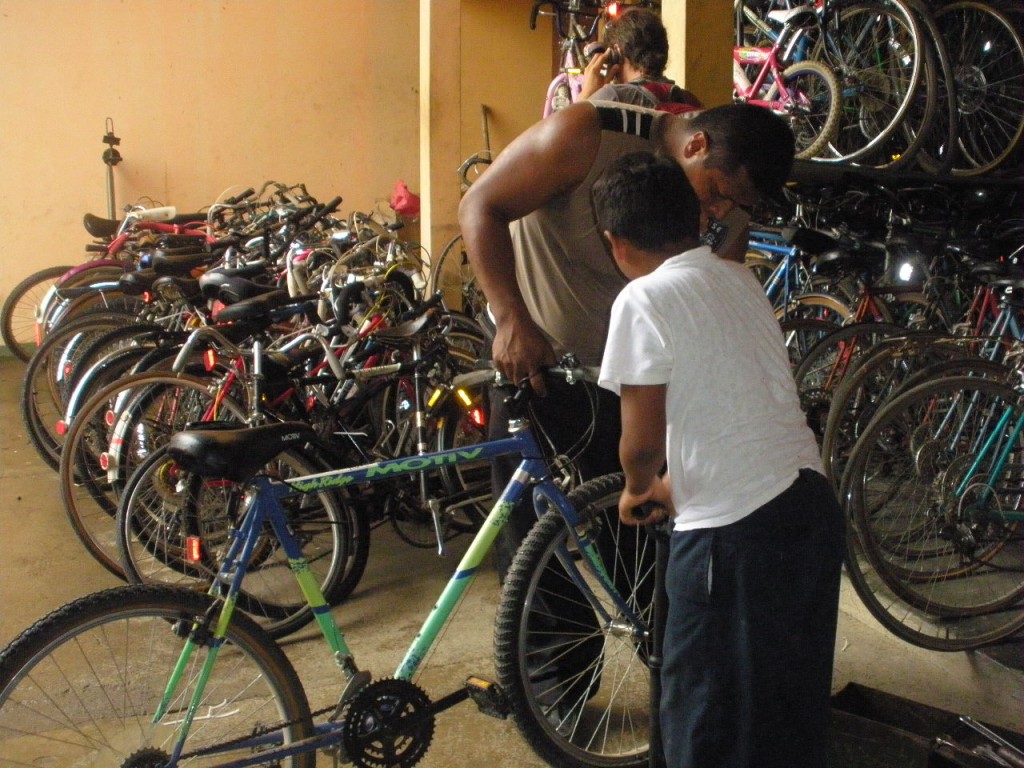
Pedals for Progress is on the Newtown Patch website:
Spring 2010 InGear
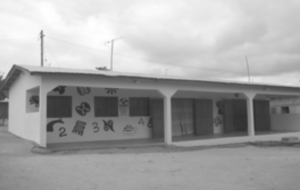
Project OKURASE, in Ghana, recently received their second container from Pedals for Progress, bringing the overall numbers shipped there to over 1,000 bicycles, 100 sewing machines, and even some soccer gear. These shipments have given a welcome boost to the Project’s mission to provide skills-training and formal education to vulnerable children and women, especially those affected by HIV/AIDS.
A number of undertakings and partnerships support the Project’s mission. Currently, one of the most dynamic initiatives is providing local women and children with a general education, vital job skills, and the opportunity for entrepreneurship. This is the area in which P4P has been able to most directly assist. With the bicycles received to date, the Project has been able to open two retail bike shops. The larger shop is located in the Dansoman district of Ghana’s capital, Accra, allowing the bikes to be distributed to the mass of people in the city. The second shop is located in the village of Okurase. Here, in addition to the main business of getting bicycles to those in need, interested villagers can learn bike repair and also the financial skills necessary to budget for a life-changing bicycle. The village has received the bicycle program very well.
But Project OKURASE’s name refers to more than just the village in which it is based. It is an acronym for the concepts its co-directors, Dr. Samuel Nkrumah Yeboah and Cynthia Cupit Swenson, PhD, see as the underpinnings of their mission: opportunity. For example, the distribution of bicycles supports this mission by helping farmers spend more time in their fields and less time in transit, by helping vendors bring more goods to market, and also by helping people from far-flung surrounding communities reach the Project’s educational programs.
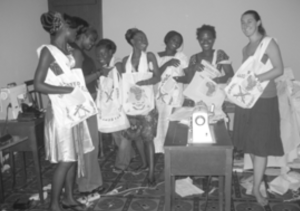
One of the most exciting of these educational programs is Rhion’s Sewing Centre. Established in Okurase upon the arrival of the first shipment of P4P sewing machines, it not only teaches young women needlecraft but also business skills. The Project’s U.S.-based volunteer creative director, Rhion Magee (who is also a creative director for DreamWorks Animation) has helped the Project design and develop marketable products handcrafted from readily-available recyclable materials. One example of what the women make and sell is an attractive and durable marketbag made of repurposed flour and rice bags. This and other products are available globally from the Project’s website.
The women of Rhion’s Sewing Center are also supporting one of Project OKURASE’s most inspiring efforts. In a partnership with a nonprofit group in Los Angeles, they are introducing an international line of children’s clothing. These clothes will be made from Ghanaian fabric, in Los Angeles, by women who are in recovery from difficult life situations. A portion of the proceeds will return to the women of Rhion’s Sewing Centre so they can produce more fabrics, and also make school uniforms for orphans and impoverished children in Ghana.
Project OKURASE has also used P4P machines in their sewing outreach program. It is simply not possible for every interested woman or child to reach a place like Rhion’s Sewing Centre. So, the Project donates sewing machines to other local partner organizations. One such is the Street Children’s Academy in Accra, which serves hundreds of street children in its day programs. Until they received one of P4P’s sewing machines through Project OKURASE, they had not been able to offer sewing classes. Another donation was made to New Life Orphanage in the Central Region, one of Ghana’s poorest districts. Several of the residents there had expressed a strong interest in learning the seamstress trade, which had hitherto been closed to them for want of training and equipment.
It is strong partners such as Project OKURASE that make it possible for P4P to do its overseas work. The United States is rich in equipment and resources that developing countries are desperately lacking and, with our supporters’ donations, we are able to collect a considerable amount of it, new and used, for distribution overseas. But it takes local organizations in the destination countries to know how best to share out that equipment and those resources where they will do the most good. In supporting Pedals for Progress, our contributors also support the efforts of our partners, who live in those developing countries and have very real stakes in their economic development.
The people of Project OKURASE wish to give their thanks, or medaase, to Pedals for Progress and our supporters. We at P4P would like to say medaase to you as well. It would not be possible to operate without your continued assistance.
Fall 2009 InGear
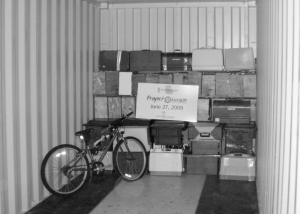 A member of the Board of Project OKURASE contacted P4P earlier this year specifically looking for the donation of sewing machines. P4P was very interested in the project and wished to be of assistance. Through the good graces of our Ghanaian partner, WEBikes, we were able to get twelve sewing machines delivered to Project OKURASE. While this first donation has initiated the sewing job skills training program, it quickly became evident that the need was much greater.
A member of the Board of Project OKURASE contacted P4P earlier this year specifically looking for the donation of sewing machines. P4P was very interested in the project and wished to be of assistance. Through the good graces of our Ghanaian partner, WEBikes, we were able to get twelve sewing machines delivered to Project OKURASE. While this first donation has initiated the sewing job skills training program, it quickly became evident that the need was much greater.
P4P had fifty sewing machines that we wished to ship to Okurase, which included 3 manual foot pedal machines donated by Furniture Assist, a New Jersey nonprofit which collects used furniture that is donated to disadvantaged families in New Jersey. The standard problem presented itself; the goods were available here, needed there, but how to pay for the transportation costs.
The cost to airfreight sewing machines is very prohibitive. In fact the cost to ship these fifty machines air freight is not that much less than the cost of shipping a full container of bicycles. This is where Joey Penman, a strong supporter of Project OKURASE, and the Clif Bar Family Foundation, a major supporter of Pedals for Progress, came in. Together they donated enough funding that added to existing Project OKURASE funds made it possible to ship not only the fifty sewing machines, but to allow P4P to place those machines in among a full container of bicycles. Certainly receiving an unexpected 480 bicycles in addition to the 50 sewing machines will greatly change the small village of Okurase, located in the West Akyem district of the eastern region of Ghana.
The four overarching goals of Project OKURASE are to develop:
For more information: Project OKURASE Economic Self-Sufficiency
by Andrei Rusanovschi
Fall 2005 InGear
He started repairing old Soviet bikes in his apartment to earn money for food. He built up his skill of talent and sweat. Bikes have changed his way of life and he changed the way bikes run across Stefan Voda and, ultimately, across Moldova.
Stefan Voda is a small city, situated not far from the Black Sea, and not too far from the capital of the Republic of Moldova, Chisinau, but far enough to have its unique salt and quietness.
Since ’91, after the fall of Soviet Union, many aspects of Moldova’s infrastructure were ruined, including the roads and public services.
Stefan Voda’s public transport system has never been petted; by anybody. The system has simply never existed. That is why bikes play such an important role in connecting the so-called private sector with the center of the town.
In Stefan Voda the bike shop is in the building of the Maria Biesu School of Arts. Walking down the steps to the shop one senses little by little the smell of rubber. The smell has already became characteristic and is readily associated with bikes — no other place in Stefan Voda has that many and such a big variety of them. Everyone knows “if you want good bikes at good prices, go the store in the basement.”
The bike shop, once a messy and unorganized place, now looks like it found a master. The room that once was too small to house two hundred bikes is now transformed into a neat bike store and a fitting shop, accommodating four hundred plus bikes of different sizes, models and function.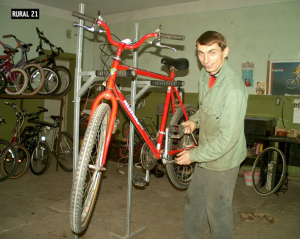
When you enter the shop you see an energetic guy, always busy with fitting the bikes and making the place better. He even makes his own bike stands, inventing modifications, building bikes virtually from nothing. In comparison, it is quite simple to prep bikes in such good condition as those from Pedals for Progress.
To a big extent, it is due to Valeriu that the Moldova #3 project became possible, or at least potentially viable, says Vitalie Rusanovschi, director of Center Rural21, the NGO that administers the project in Moldova.
Valeriu started repairing bikes in his small one-bedroom apartment. “I never thought I would deal with bicycles on the professional level,” says Valeriu. “I just liked riding them when I was little. And, as a kid, I always liked to see what’s inside.”
After the Army I had to choose what direction to take, says Valeriu. I decided to go further with my education and studied automobiles. While studying in Chisinau, fate brought me together with a bike service center. This is when I began to study the subtleties of bike mechanics.
Now he works with Center Rural21, the regional NGO promoting democracy, healthy life style and sustainable development. The Pedals for Progress project is running in Moldova for the third time. The previous two shipments made essential improvements to the public transport infrastructure. It is readily visible when coming to the town.
“I could instantly see that Stefan Voda is now much better equipped with bikes than ever before,” says Mark Skelton, the Peace Corps Volunteer in Moldova who was the first to contact Pedals for Progress in 2002, arranging for the first shipment of bikes from the USA. Mark visited Stefan Voda during the second week of August 2005. It had been two years since he finished his duty in Moldova with Peace Corps.
“I am impressed how Valeriu has organized his workplace,” says Mark. “It is neat and well structured, and it seems he improves it every second,” says Mark after a half-day visit to the bike store.
“The best gratitude for me would be the bike I fit to never come back for repair,” says Valeriu. “I will just welcome them at least once a year for maintenance work.”
The Pedals for Progress project proved to be sustainable and a long-lasting relationship, and with Valeriu Soloviov responsible for the fitting process, we will fill Moldova up with reliable, environment-friendly means of transport — bicycles, said Center Rural21 director, Vitalie Rusanovschi.
by Darren Enterline, Peace Corps Volunteer
Fall 2009 InGear
Few people outside of Europe have ever heard of the Republic of Moldova. What those few usually do know is that the former Soviet Republic has the dubious distinction of consistently being the poorest nation in Europe. While many of the former Soviet-controlled states have thrived as independent democracies, Moldova has never been able to progress out of the political chaos of the early 1990s and the economic crises that followed. In 2008 the United Nations Human Development Report ranked Moldova 113th out of 179 nations, between Mongolia and Vietnam.
The failure of the Moldovan government to transition from a communist Soviet Republic to an independent capitalist democracy means that much of the population currently lives in poverty. While the capital, Chisinau, and larger cities have recently shown signs of economic recovery, the countryside still suffers greatly. The rural village where Pedals for Progress’s partner organization is located is no exception. Pelinia, never a wealthy village, once supported industries such as brick manufacturing and food canning until the collapse of the Soviet Union. The ensuing privatization of state industries brought an end to those enterprises that couldn’t survive the new market economy. Today, most villagers in Pelinia support themselves by farming the small plots of land given to them after the collective Soviet farms were privatized in 1996. Many depend solely on these plots, approximately 4 to 10 acres, for both their food and income. Oftentimes, these plots are several kilometers outside the village forcing villagers to use valuable time travelling to and from their land. To make matters worse, the roads used to reach the plots are unpaved and deeply rutted, making it slow going for the ancient cars and horse carts that use them.
Because so many people are involved in small-scale, low-income farming, the local government is chronically underfunded and unable to provide even the most basic services. Few houses have running water, making it necessary for many to walk to public wells to retrieve their water. Gas is also only available to a few households and is too expensive for many to use. Those that can’t afford to buy wood or coal must travel outside the village to collect their own wood in order to heat their homes during the winter. Although Pelinia is a large village of over 8000 inhabitants, it is too small to offer public transportation. Villagers must provide their own means to travel to stores, markets and schools on roads that are not much better than the ones outside of the village. Basically, the villagers of Pelinia endure the same difficulties that impoverished people all over the world endure.
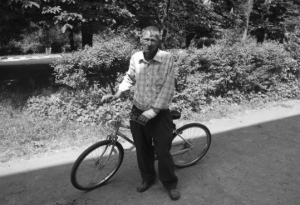 While these hardships are debilitating, they are not impossible to overcome and Pedals for Progress offers one of the best ways to assist the villagers of Pelinia. Consult-Nord, a local Moldovan NGO established to promote local economic development in Pelinia, saw the potential results that Pedals for Progress’s bicycles could provide and requested to become a partner. Consult-Nord started selling bicycles this winter after receiving a shipment in late December of last year. The good quality, affordable bicycles now available at a shop set up by Consult-Nord offer numerous opportunities to villagers that otherwise would be inaccessible to them. With a bicycle, farmers can efficiently travel to their fields and more easily transport their crops and tools. Villagers can collect water and firewood with less effort. Students can arrive at school with more energy and villagers can independently travel throughout the village. A great example of how bicycles can help the villagers of Pelinia comes from Constant Surcanu. He is a 53-year-old farmer who regularly travels outside the village to work on his land. He bought a bicycle so he can reach his fields with more time to spare and so that he can also visit his relatives living throughout the village. He told us that he especially appreciates his bicycle’s wide, sturdy tires that can handle the demanding village roads. Another satisfied customer is Oleg Cerban. He is a 13-year-old student at the local middle school who bought a mountain bike so he could use it to get to school, to go on errands around the village for his family, and, of course, to visit his friends. These two examples show a few ways how bicycles can help the people of Pelinia. Simply put, bicycles in Pelinia provide what they provide to people all over the developing world, a simple means to independently better their lives.
While these hardships are debilitating, they are not impossible to overcome and Pedals for Progress offers one of the best ways to assist the villagers of Pelinia. Consult-Nord, a local Moldovan NGO established to promote local economic development in Pelinia, saw the potential results that Pedals for Progress’s bicycles could provide and requested to become a partner. Consult-Nord started selling bicycles this winter after receiving a shipment in late December of last year. The good quality, affordable bicycles now available at a shop set up by Consult-Nord offer numerous opportunities to villagers that otherwise would be inaccessible to them. With a bicycle, farmers can efficiently travel to their fields and more easily transport their crops and tools. Villagers can collect water and firewood with less effort. Students can arrive at school with more energy and villagers can independently travel throughout the village. A great example of how bicycles can help the villagers of Pelinia comes from Constant Surcanu. He is a 53-year-old farmer who regularly travels outside the village to work on his land. He bought a bicycle so he can reach his fields with more time to spare and so that he can also visit his relatives living throughout the village. He told us that he especially appreciates his bicycle’s wide, sturdy tires that can handle the demanding village roads. Another satisfied customer is Oleg Cerban. He is a 13-year-old student at the local middle school who bought a mountain bike so he could use it to get to school, to go on errands around the village for his family, and, of course, to visit his friends. These two examples show a few ways how bicycles can help the people of Pelinia. Simply put, bicycles in Pelinia provide what they provide to people all over the developing world, a simple means to independently better their lives.
In the developing world, in the hands of someone who knows how to use one, a sewing machine means instant income. The following two profiles are fairly typical examples of how sewing machines help people in the developing world, whether in Latin America, Africa, or Eastern Europe.
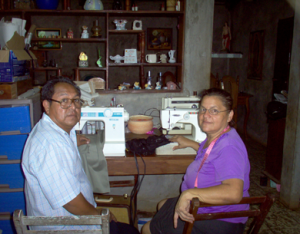 Juan Carlos and Migdalia Dávila
Juan Carlos and Migdalia Dávila
For years, Juan Carlos Dávila worked by day as a receptionist at a private institution in Jinotepe. His wife, Migdalia, is a skilled seamstress. At night, he helped her with the sewing to earn extra money for their family.
His receptionist salary was barely enough for them and their 11-year-old son to get by on. As their tailoring business grew, it was their hope that one day they could come to depend on it as their sole income. But a second sewing machine, a new one, was far too costly.
In November 2008, Juan Carlos was suddenly laid off from his receptionist job. Today, he and Migdalia survive because they can both sew, and because they were able to get a second sewing machine from Pedals for Progress through our partner organization Ecobicicletas Rivas. Today at their tailor shop, they make men’s suits, women’s dresses, curtains, table linens, and they are currently searching for an employee or two to expand their business.
Elvis Cruz is 25 years old and from Managua, Nicaragua. He was born disabled; both of his arms are severely deformed. While this provided certain challenges, it hasn’t kept Elvis from working, playing baseball, or otherwise living a full life. Married with two young children, Elvis works as a flagman directing traffic in Managua. But his income wasn’t enough to adequately support his family. After making a public appeal on a local TV show for the opportunity to earn more money, his wife received a sewing machine from one of our partners. A talented seamstress, now she works from their home earning extra income for their family.